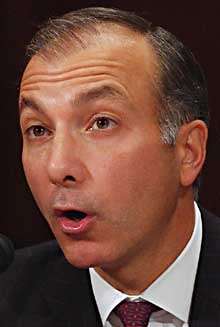
back

|

|

Pension Peril Looming: U.S.
By Stephen Lynch, New York Post
January 11, 2004
Pension Panic: A wave of corporate bankruptcies has put the Pension Benefit Guaranty Corporation in a tight spot and $8.8 billion in the red. It's outgoing chief, Steven
Kandarian, sounded the alarm last week.
This past week, the head of the Pension Benefit Guaranty Corporation - the government agency that insures the pensions of millions of Americans - announced he will be leaving in February.
His resignation letter was less a fond farewell than a dire warning.
"Workers and retirees have lost promised benefits, PBGC has suffered multibillion-dollar losses and responsible companies have been placed at risk," Steven A. Kandarian wrote. "If we do not take action soon, these consequences will repeat themselves."
Kandarian's characterization of America's pension programs was that of an economic time bomb, one that was set to explode in the hands of taxpayers, who "may find themselves called upon to bail out the pension insurance system."
Even as the economy has improved, the PBGC has been forced to pick up the retirement benefits for more and more businesses, particularly large steel companies and airlines. The obligation has become crushing.
PBGC is expected to announce its results for 2003 in the next two weeks, and the numbers won't be heartening. The number of workers falling under government, and not corporate, protection is expected to top 1 million. Meanwhile, the PBGC's largest fund, for single-employer plans, will be driven even deeper into debt.
Things started getting dicey at the PBGC in 2002, when the single-employer fund dropped from a $7.7 billion surplus to a $3.6 billion deficit. Things deteriorated even faster last year. By August, the deficit had increased to $8.8 billion.
The agency was able to cover the gap with its sizable assets, but those reserves won't last forever.
The PBGC is not funded by taxpayer money; it covers pensions using premiums paid by viable companies. Corporations already complain about the size of those premiums, however, and efforts to increase them should face stiff resistance. Businesses also are lobbying Congress to change the formulas that determine the size of pension benefits, but that effort has stalled in the Senate.
The situation may only get worse in 2004, as the United Parcel Service is pushing for the PBGC to pick up some of its pension liabilities. UPS claims that it is unfairly saddled with the pensions of defunct companies under a "multiple-employer plan."
Workers are angry as well. When the PBGC picks up a pension plan, be it from U.S. Airways or LTV Steel, they often get only a fraction of what they were originally promised. Critics say corporations have been irresponsible, and now are forcing healthy industries to pick up the tab and endangering the retirements of millions.
"Some argue that the current problems are cyclical and that they will disappear as the stock market recovers," Kandarian told Congress last year. "But it is not reasonable to base pension funding on the expectation that the unprecedented stock market gains of the 1990s will repeat themselves."
Copyright © 2002
Global Action on Aging
Terms of
Use | Privacy
Policy | Contact Us
|

